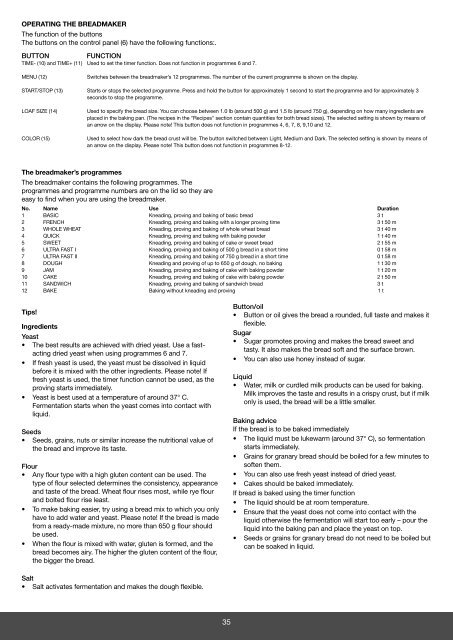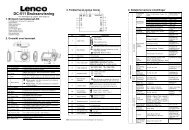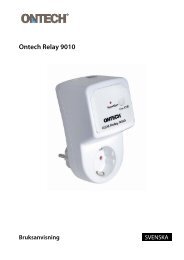SE DK NO FI UK DE PL RU
SE DK NO FI UK DE PL RU
SE DK NO FI UK DE PL RU
Create successful ePaper yourself
Turn your PDF publications into a flip-book with our unique Google optimized e-Paper software.
ev_Breadmaker_IM 31/10/05 13:09 Side 35<br />
OPERATING THE BREADMAKER<br />
The function of the buttons<br />
The buttons on the control panel (6) have the following functions:.<br />
BUTTON FUNCTION<br />
TIME- (10) and TIME+ (11) Used to set the timer function. Does not function in programmes 6 and 7.<br />
MENU (12) Switches between the breadmaker’s 12 programmes. The number of the current programme is shown on the display.<br />
START/STOP (13) Starts or stops the selected programme. Press and hold the button for approximately 1 second to start the programme and for approximately 3<br />
seconds to stop the programme.<br />
LOAF SIZE (14) Used to specify the bread size. You can choose between 1.0 lb (around 500 g) and 1.5 lb (around 750 g), depending on how many ingredients are<br />
placed in the baking pan. (The recipes in the "Recipes" section contain quantities for both bread sizes). The selected setting is shown by means of<br />
an arrow on the display. Please note! This button does not function in programmes 4, 6, 7, 8, 9,10 and 12.<br />
COLOR (15) Used to select how dark the bread crust will be. The button switched between Light, Medium and Dark. The selected setting is shown by means of<br />
an arrow on the display. Please note! This button does not function in programmes 8-12.<br />
The breadmaker’s programmes<br />
The breadmaker contains the following programmes. The<br />
programmes and programme numbers are on the lid so they are<br />
easy to find when you are using the breadmaker.<br />
No. Name Use Duration<br />
1 BASIC Kneading, proving and baking of basic bread 3 t<br />
2 FRENCH Kneading, proving and baking with a longer proving time 3 t 50 m<br />
3 WHOLE WHEAT Kneading, proving and baking of whole wheat bread 3 t 40 m<br />
4 QUICK Kneading, proving and baking with baking powder 1 t 40 m<br />
5 SWEET Kneading, proving and baking of cake or sweet bread 2 t 55 m<br />
6 ULTRA FAST I Kneading, proving and baking of 500 g bread in a short time 0 t 58 m<br />
7 ULTRA FAST II Kneading, proving and baking of 750 g bread in a short time 0 t 58 m<br />
8 DOUGH Kneading and proving of up to 650 g of dough, no baking 1 t 30 m<br />
9 JAM Kneading, proving and baking of cake with baking powder 1 t 20 m<br />
10 CAKE Kneading, proving and baking of cake with baking powder 2 t 50 m<br />
11 SANDWICH Kneading, proving and baking of sandwich bread 3 t<br />
12 BAKE Baking without kneading and proving 1 t<br />
Tips!<br />
Ingredients<br />
Yeast<br />
• The best results are achieved with dried yeast. Use a fastacting<br />
dried yeast when using programmes 6 and 7.<br />
• If fresh yeast is used, the yeast must be dissolved in liquid<br />
before it is mixed with the other ingredients. Please note! If<br />
fresh yeast is used, the timer function cannot be used, as the<br />
proving starts immediately.<br />
• Yeast is best used at a temperature of around 37° C.<br />
Fermentation starts when the yeast comes into contact with<br />
liquid.<br />
Seeds<br />
• Seeds, grains, nuts or similar increase the nutritional value of<br />
the bread and improve its taste.<br />
Flour<br />
• Any flour type with a high gluten content can be used. The<br />
type of flour selected determines the consistency, appearance<br />
and taste of the bread. Wheat flour rises most, while rye flour<br />
and bolted flour rise least.<br />
• To make baking easier, try using a bread mix to which you only<br />
have to add water and yeast. Please note! If the bread is made<br />
from a ready-made mixture, no more than 650 g flour should<br />
be used.<br />
• When the flour is mixed with water, gluten is formed, and the<br />
bread becomes airy. The higher the gluten content of the flour,<br />
the bigger the bread.<br />
Salt<br />
• Salt activates fermentation and makes the dough flexible.<br />
35<br />
Button/oil<br />
• Button or oil gives the bread a rounded, full taste and makes it<br />
flexible.<br />
Sugar<br />
• Sugar promotes proving and makes the bread sweet and<br />
tasty. It also makes the bread soft and the surface brown.<br />
• You can also use honey instead of sugar.<br />
Liquid<br />
• Water, milk or curdled milk products can be used for baking.<br />
Milk improves the taste and results in a crispy crust, but if milk<br />
only is used, the bread will be a little smaller.<br />
Baking advice<br />
If the bread is to be baked immediately<br />
• The liquid must be lukewarm (around 37° C), so fermentation<br />
starts immediately.<br />
• Grains for granary bread should be boiled for a few minutes to<br />
soften them.<br />
• You can also use fresh yeast instead of dried yeast.<br />
• Cakes should be baked immediately.<br />
If bread is baked using the timer function<br />
• The liquid should be at room temperature.<br />
• Ensure that the yeast does not come into contact with the<br />
liquid otherwise the fermentation will start too early – pour the<br />
liquid into the baking pan and place the yeast on top.<br />
• Seeds or grains for granary bread do not need to be boiled but<br />
can be soaked in liquid.






